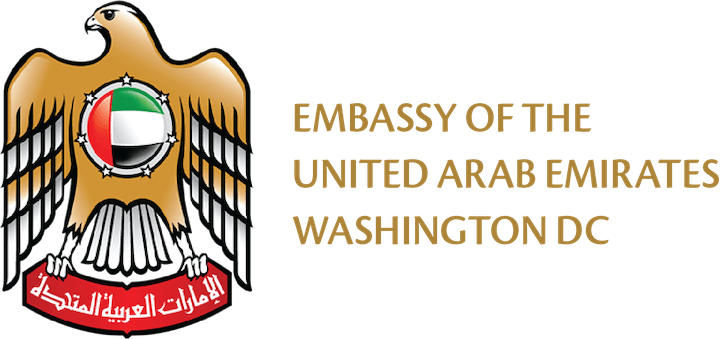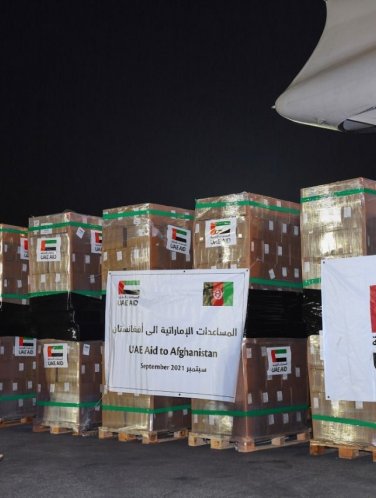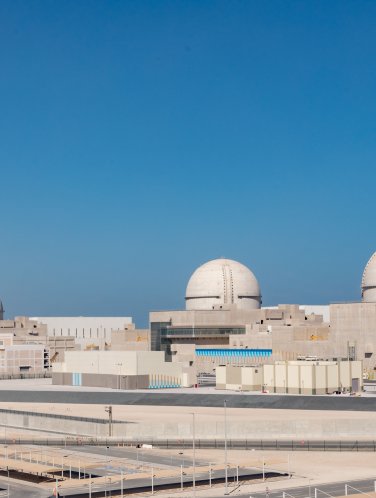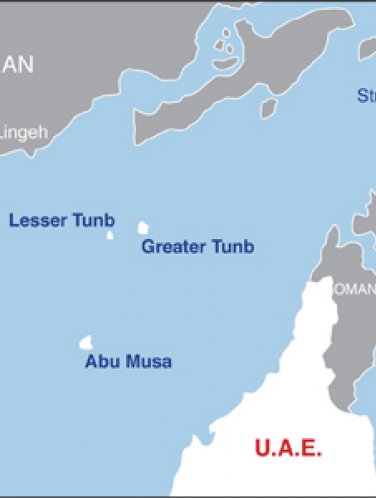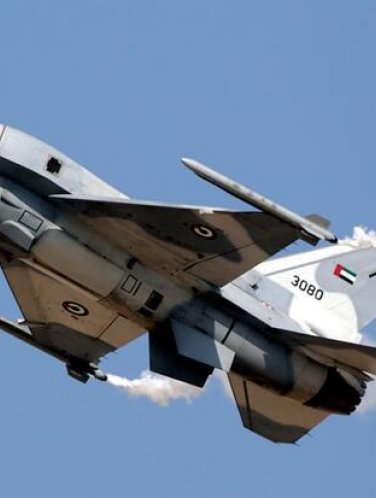As an active member of the global community, the UAE engages with the world and works to achieve a more stable, peaceful Middle East. The principles guiding UAE foreign policy were expressed by the country’s first President, His Highness Sheikh Zayed bin Sultan Al Nahyan. Sheikh Zayed’s principles included an underlying belief in justice in international dealings between states, and the pursuit, wherever possible, of peaceful resolutions of disputes, with strong support for international institutions, such as the United Nations (UN). Through its support for such institutions, the UAE seeks to ensure stability and protect the interests of the small, the weak and the powerless.
Foreign aid targeting poverty reduction, education and public health is a priority as well. In 2018, the UAE sent over $7 billion of aid to 42 countries, exceeding the UN's 0.7 percent official development assistance (ODA) target for the sixth consecutive year.
In 2020, the UAE delivered more than 1,685 metric tons of medical aid to over 120 countries in need, supporting more than 1.6 million medical professionals in the fight against COVID-19.
Security and Stability
The UAE occupies a critical strategic position on the Arabian Gulf. Today, the UAE provides UN, US, European Union (EU) and NATO forces unprecedented access to ports and territory, flyover clearance and critical logistical assistance.
The UAE has joined its allies to support the global fight against extremism and restore stability to the Middle East. The UAE works closely with the United States in the war on terror, providing military, logistical and intelligence support. The UAE has also frozen the accounts of known terrorists and enacted aggressive anti-money laundering initiatives. New counter-terrorist financing laws and regulations have been introduced and enforced.
The UAE is also a member of the Gulf Cooperation Council (GCC) and the Arab League, as well as the UN and its agencies.
Supporting the Government of Yemen
The UAE participated in a regional to support the legitimacy of the government of Yemen. The UAE responded to a request from President Abd Rabbu Mansour Hadi to help combat the Houthi rebels who have caused chaos and instability in the country and region. The UAE also worked with the United States on closely coordinated intelligence and military operations against al-Qaeda in the Arabian Peninsula (AQAP). The UAE ended its military involvement in Yemen in October of 2019.
The UAE continues to provide aid and emergency assistance to the Yemeni people. The UAE has disbursed more than $6 billion to support humanitarian initiatives in Yemen, both from the UN and through other entities.
The UAE believes that a political process offers the only lasting solution and strongly supports the efforts of UN Special Envoy Martin Griffiths.
Supporting the Resolution of the Syrian Crisis
The UAE believes there needs to be a political process in Syria, and there needs to be a post-war constitution. Substantial investment for reconstruction should only come with the political process.
The UAE remains committed to helping solve this humanitarian situation. In addition to welcoming more than 123,000 Syrians since the crisis began, the UAE has provided more than $750 million in support of Syrian refugees. In 2020, the UAE sent three shipments of medical aid to Syria to help reduce the spread of the COVID-19 pandemic and support Syrian medical professionals.
Supporting the Iraqi Government
The UAE supports the Iraqi government in achieving peace and security in Iraq, in order to reach unity and put an end to sectarianism. The UAE will continue its humanitarian commitments in Iraq and will continue supporting programs that help people in conflict-affected areas.
Supporting Egypt
The UAE believes that the stability and prosperity of Egypt is integral to the stability of the region. Egypt has an important position in the region as the largest Arab nation and a dependable ally in the fight against extremism. The UAE praises Al-Azhar Institution for its longstanding commitment to combat extremist ideologies.
The UAE has provided significant development assistance to help grow the Egyptian economy and is committed to helping the people of Egypt through economic reforms and the creation of jobs and opportunities.
Commitment to Afghanistan
The UAE continues to make a significant humanitarian contribution in Afghanistan, and has done so since the 1970s. UAE donor organizations have contributed over $680 million USD in development and humanitarian assistance. These investments have enabled the construction of schools, medical clinics, a major hospital, a public library and numerous mosques, among other projects. In 2020, the UAE sent two shipments of medical supplies to Afghanistan, which supported thousands of medical professionals as they worked to combat the COVID-19 pandemic.
UAE special forces fought alongside US and coalition soldiers in Afghanistan for more than a decade. UAE forces protected humanitarian initiatives and ensured safety and stability for local communities. Personnel were also directly involved in culturally sensitive community development activities, especially activities necessitating knowledge of the Arabic language or Islamic traditions, alongside representatives of key humanitarian organizations such as the Red Crescent.
Iran
The UAE, alongside members of the international community, shares a deep concern over Iran’s aggression in the region and its impact on peace and stability. The UAE fully supports and enforces UN Security Council resolutions barring shipment of sensitive materials and technologies to Iran. The UAE is concerned with Iran’s aggression in the region. The UAE also calls for the restoration of the UAE’s three invaded islands, Abu Musa, Greater Tunb and Lesser Tunb.
Located just across the Gulf from one another, the UAE and Iran have historic ties, including a significant trading relationship. The UAE and its allies in the GCC want the entire region to be free of weapons of mass destruction.
Israel and Palestine
On August 13, 2020, the UAE announced an agreement with Israel to normalize relations. The accord immediately put an end to Israel’s plans for the annexation of Palestinian lands.
The agreement is a significant advance in Arab-Israeli relations that lowers tensions and creates new energy for positive change across the region. It maintains the viability of a two-state solution as endorsed by the Arab League and international community.
Normalizing ties has already begun and will progress in phases. Closer ties between two of the Middle East’s most dynamic economies and vibrant societies will accelerate growth and innovation, expand opportunities for young people and break down long-held prejudices. Near-term plans include discussions on visa access; air, telecommunications and shipping links; collaboration on health, water and food security, climate change, technology and energy; cultural and educational exchanges; ministerial-level visits; and a reciprocal exchange of Embassies.
The UAE continues to steadfastly defend the Palestinian right to an independent state with Jerusalem as its capital. Under the new deal, the UAE will use its position to forcefully advocate for that end. However, any and all progress on the matter must derive from direct dialogue between Palestine and Israel themselves.
